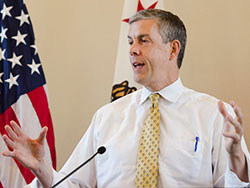Education Secretary speaks at Stanford

Secretary of Education Arne Duncan says one of the big challenges to effective school reform is the lack of diversity among teachers.
"I hate that the nation's teachers don't reflect the diversity of the nation's children," Duncan told reporters gathered at Stanford on Thursday for the Education Writers Association seminar.
Duncan said only 14 percent of teachers are people of color compared with 40 percent of students.
"How we embrace diversity, how we embrace the community, how we make sure this hard work reflects who we are as a nation is hugely, hugely important," Duncan said in response to a question.
Duncan also said that when decisions about schools come from the top down and leave out the voices of parents and communities, "you put a limit on how far you can go."
Duncan's stop at Stanford was part of a swing through the Bay Area, where he visited schools and spoke to education leaders. Duncan is promoting President Barack Obama's $75 billion plan to massively expand early childhood education.
At Stanford he addressed the conference highlighting the topics he would like to see reporters cover in education – gun violence in schools, professional development, teacher assessment, the role of technology in higher education, for example – and he took questions from reporters on everything from the cheating scandal in Atlanta to the recent online testing problems in Indiana.
- On universal preschool, Duncan said there is a diverse coalition including business and military leaders, ministers, police officers and parents who support the proposal that would fund public preschool for any 4-year-old whose family income was below twice the federal poverty level. He conceded it would still be tough to sell Congress, already reluctant to provide new dollars to programs, but "this is a battle really worth fighting."
- On cheating, Duncan was asked whether any of his policies created a climate for dishonesty. "Cheating is not a new issue," he said. "What we have to do is create a culture where it's not tolerated."
- On the role of MOOCs, or massive open online courses, in higher education, Duncan said they may help control costs, which are "crushing a lot of Americans." He said it's too early to judge how online learning will ultimately change the college experience. "It's an emerging story," he said.
- On technical glitches that halted online testing for high school students in several states recently, Duncan said not to give up because of the problems. "There will be hurdles, there will be mistakes … but this is a business."
- On gun violence, Duncan said, "What we're seeing around the country is absolutely stunning and unacceptable." He said kids live in war zones. "How do you plan for your future when you're just trying to make it through the day?" He lamented Congress' inaction on recent gun control legislation. "I've never seen an issue where the American public is so clear on something … and Congress has said no."
The Education Writers Association seminar, "Creativity Counts: Innovation in Education and the Media," was hosted by the Stanford Graduate School of Education, the Stanford Center for Opportunity Policy in Education and the American Educational Research Association.
Stanford scholars in education were among those who presented their research on achievement gaps, why high-achieving but low-income kids don't apply to selective colleges, online education, charter schools and opportunity gaps.
Media Contact: Brooke Donald, Stanford News Service: (650) 725-0224, brooke.donald@stanford.edu

